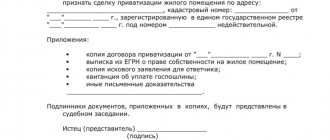Last modified: October 2021
Citizens registered on a permanent basis in housing from the municipal fund have the right to apply to the administration with a request for privatization. This right is granted once, giving the opportunity to transfer the property to personal disposal without any payment. However, the re-registration procedure is purely voluntary. If desired, you can formalize a refusal of privatization, while retaining the right of lifelong residence in the former territory.
Is it possible to refuse to privatize an apartment to one person in favor of others?
It’s worth pointing out right away that the current legislation does not directly mention the possibility of refusing to privatize an apartment. However, from the provisions of Art. 1 of the Law of the Russian Federation dated July 4, 1991 No. 1541-1 it follows that the procedure for transferring state real estate into the ownership of citizens is implemented on a voluntary basis. It follows that any registered person can waive the right granted to him.
Attention . It is worth noting that in this case we are not talking about expressing disagreement with privatization, but only about renouncing one’s share in the apartment, which becomes the property of the persons registered in it.
There is a fundamental difference between these concepts. In the first case, if at least one of the residents expresses their disagreement, such a procedure will not be possible.
On judicial practice in housing cases and analogies of the law in housing disputes
In our case, the court applied an analogy of the law (Article 7 of the Civil Code of the Russian Federation), namely, Part 3 of Art. 83 of the Housing Code of the Russian Federation also includes the explanations contained in paragraph 32 of the above-mentioned Resolution of the Plenum of the Supreme Court of the Russian Federation dated July 2, 2009 No. 14 “On some issues that arose in judicial practice when applying the Housing Code of the Russian Federation.”
This rule of law provides for the termination of a person’s right to use residential premises due to this person’s refusal of such right: leaving for another place of residence, non-use of residential premises as a place of permanent residence, etc.
It can be stated that the courts adopted the guiding judicial practice and began to more actively use the analogy of the law when resolving this category of disputes.
———————————————————————————————————————
For more information, see “Review of the judicial practice of the Supreme Court of the Russian Federation for January - July 2014” (approved by the Presidium of the Supreme Court of the Russian Federation on September 1, 2014), Ruling of the Supreme Court of the Russian Federation dated August 4, 2015 N 49-KG15-7
———————————————————————————————————————
Reasons for avoiding participation in the process
People may refuse their share in privatized housing for a variety of reasons. The most common reasons for non-participation in the process include the following situations :
- The intention of the copyright holder to transfer his share to a close relative (for example, children). In this case we are talking about refusal of privatization in favor of another person.
- Intention to privatize a more valuable apartment in the future (in terms of area, number of rooms, location, etc.). According to the law, a citizen has the right to obtain state real estate free of charge only once, so some citizens are in no hurry to use this right.
- Reluctance to fulfill the obligation to pay real estate tax, which inevitably arises after the apartment becomes private property.
- Other reasons.
What does the right to use premises mean?
Although the right of use does not mean ownership and disposal of housing, it is inextricably linked with private property.
During the residence process, conflicts and controversial issues related to gaining access to common territory and amenities are not excluded. If coexistence brings serious discomfort, the owner may want to terminate the right to use the apartment, which legally belongs to him. However, ordinary eviction on the initiative of the owner is impossible if there are no grounds for parting with an inconvenient tenant who is exercising his powers.
The right of use is a rule of law that gives a person the opportunity to live and use property that does not belong to him, having legal grounds for doing so. Residents can decide to live in an apartment owned by another owner without receiving the right to sell, donate or otherwise dispose of square meters.
Depending on the circumstances of gaining access to someone else’s real estate, there are several options for the basis on which the non-owner resolves the housing issue.
For whose benefit can this be done?
As mentioned above, one of the most common reasons for refusing to obtain ownership of privatized housing is the transfer of one’s share to another person. However, you should be aware that those not participating in the procedure for transferring housing into private ownership can renounce their share only in favor of those persons who also have the right to privatize a specific apartment. As a rule, these are family members living in the same municipal housing.
In addition, you cannot write a refusal in favor of a specific person. In any case, the released share will be proportionally redistributed among all participants in the transaction.
With rent
The rentee is the former owner of the apartment who sold the housing on the condition that he will receive maintenance from the new owner and retain the opportunity to use the housing.
How it arises. The right to use someone else's housing arises on the basis of a signed rental agreement. The subject of the agreement between the parties is the home and the conditions for its transfer to another owner. The dependent, after signing the annuity agreement, retains the right of lifelong occupancy until death.
In each individual case, the list of requirements and the amounts spent depend on:
- from the real cost of housing;
- personal wishes of the seller;
- competence of lawyers advising parties to the transaction.
The list of put forward requirements can be anything. All conditions must be specified in detail, documented, and signed by a notary by both parties.
There are two types of annuity. In the first case, payment and maintenance of the dependent continues until his death. In the second case, the new owner spends money on the former owner until he pays off a certain amount. In both cases, the seller and buyer enter into a notarized rental agreement with the right of lifelong residence. The relationship between the parties when registering rent is regulated by Art. Art. 601, 602, 603, 604, 605 ch. 33 Civil Code of the Russian Federation.
Where to look. In addition to the certificate of registration, you need to look at the basis document. The annuity agreement will specify who the annuitant is. It is also possible that, in addition to the former owner of the property, any third party may live in the apartment.
Rights of a registered conscientious objector
Even after renouncing his share, the citizen retains all rights in relation to the apartment privatized by other residents. He has the right to reside and use such real estate indefinitely, that is, for life. In this case, no one can evict him against his will. The refusenik has the right to inherit such living space if a relative owned it before his death.
Right of lifelong residence
In accordance with the established procedure, persons who renounced their share during privatization receive the right to live in such an apartment for life. This means that they can continue to use and remain in this housing even after its privatization. This condition also applies to former family members of the owner of privatized housing. This is written in Art. 19 of the Law of the Russian Federation of December 29, 2004 No. 189-FZ.
Important ! The right of lifelong residence is terminated upon voluntary deregistration of the person living in the apartment.
In case of refusal of privatization
A person who has written a refusal to privatize can live on his square meters for life, regardless of the wishes of the actual owner of the apartment. Even if the owner decides to sell the home along with the former relative registered in it, the latter will live in the premises until he himself is discharged or dies.
How it arises. The right to lifelong registration in a certain dwelling arises for citizens who lived in municipal premises at the time of its privatization, but refused to register their housing in their own name. Various situations arise in families. As a result of a divorce or conflict, the owner may have a desire to evict people close to him in the past onto the street. The rights of refuseniks to lifelong registration are protected by law.
Where to look . Lifelong residents - privatization refuseniks - are registered on paper in the certificate of registration from the passport office. Additionally, you can request a social lease agreement and a privatization agreement from the seller. By comparing them, it is possible to establish a list of residents and possible citizens with the right of lifelong residence.
Registration procedure
The procedure for registering a refusal to participate in the privatization of an apartment can be presented in the form of the following step-by-step instructions:
- First of all, a person wishing to assign his share must prepare a corresponding application and collect the necessary documents.
- You should go to a notary with a complete package of papers to certify the written refusal.
- Subsequently, the refusal certified by a notary, along with other papers, is transferred to the body in charge of privatization of housing stock (usually the city administration).
Where to begin?
The initial stage is the preparation of a written application for refusal to participate in the privatization of the apartment. In addition, the applicant also needs to collect a package of additional documents, which are described in more detail below.
Where to go?
Issues related to the privatization of housing stock are dealt with by the local administration of the city or district. Therefore, this is where the application for refusal should be sent. At the same time, it is worth remembering that before contacting the authorized body, the written refusal should be certified by a notary.
What documents are required?
In order to renounce their share in a municipal apartment, which residents register as private property, in addition to the application, the following documents will be required :
- the applicant's identity card (passport);
- child's birth certificate (if the refusal is issued on behalf of a minor);
- a social rental agreement, on the basis of which the applicant lives in privatized housing;
- extract from the house register and personal account;
- permission from the guardianship authorities (if the objector is a minor).
Attention . It is worth keeping in mind that it is quite difficult to refuse to participate in such a transaction on behalf of a child. You will definitely need to obtain permission from the guardianship authorities. Moreover, they will issue it only if it is established that the child is the owner of another property.
How to make an application, do you need notarization?
There is currently no single template for such a statement. However, over the entire period of the privatization program, a generally established model of such a document was formed. It is prepared on A4 paper. Moreover, its structure is represented by the following main points:
- The “header” of the application is placed in the upper right corner of the paper. The following data is indicated here:
- the name of the organization to which the refusal will be sent in the future (city administration);
- The applicant's full name, passport details and exact residential address.
- The main part - this section indicates that the applicant is not against privatization, while he renounces his share. Next, a note is made indicating that the objector is aware of the consequences of the decision made.
- At the end of the document, the applicant’s signature, the date of preparation of the application and the notary’s mark are placed.
We do not recommend completing the documents yourself. Save time - contact our lawyers by phone:
8 (800) 302-76-94
The refusal to participate in privatization must be certified by a notary. Moreover, before certifying such a document, an employee of the notary’s office will carefully study the reasons and conditions for such a refusal. They must be legal.
Timing and cost
The process of waiving such a right does not require any investment, with the exception of paying a state fee when certifying the application. Its amount is 100 rubles (clause 26, clause 1, article 333.24 of the Tax Code of the Russian Federation). You can submit an application for refusal within one day .
Reference . After the final completion of the privatization procedure, the extract from the Unified State Register will reflect information about the person who renounced his share in a specific property.
Consequences for such persons who did not participate in the process
Refusal to participate in the transfer of an apartment from municipal property to private property will lead to the following consequences:
- a person who has renounced his right to housing will not be able to dispose of it (sell, exchange, give, etc.);
- the share that was abandoned will be proportionally distributed among the remaining participants in the privatization procedure;
- the refusenik will receive the right to live indefinitely in a privatized apartment;
- a person who has ceded his share in an apartment will be able to re-participate in privatization in the future, but in relation to another property.
Is it possible to discharge such a person?
A person who refuses privatization can be discharged from such an apartment only with his consent. The only exception can be the case when a specific person evades paying utility bills, violates the rights and interests of other residents, uses the premises for other purposes, etc. In such a situation, the court may decide on forced eviction.
Thus, citizens have every right to refuse a share in privatized housing. In this case, it is necessary to prepare a corresponding application and be sure to have it certified by a notary.
Reasons for using residential premises: what are they?
The concept of the right to use residential premises includes cases of allowing citizens to live in residential areas without having formal authority over the property. The basis for this possibility is one of the following situations:
- a family member moves into an apartment registered in the name of another close relative;
- under a social tenancy agreement (in municipal ownership);
- under a contract or order for official housing as part of current employment;
- upon admission to a university or college (for applicants and students);
- when renting housing (under a rental agreement with the landlord);
- when transferring real estate to another owner (for the former owner under a rental agreement);
- as a tenant under a free use agreement;
- after signing the will.
Each situation has its own characteristics of the design and subsequent application of the opportunity received for a limited period of time or for life.
Cases where the owner’s consent is not required to register a residence permit include the registration of a child in the living space of one of the parents.
Lack of property does not mean exemption from responsibilities and compliance with the rules established within the framework of residence of citizens:
- The living space is used for residential purposes only.
- The transferred housing must be preserved along with the property located inside it.
- Utility bills are paid by all persons who are registered and live in the housing.
Once the authority to use has been granted, it can only be terminated in court if the spouses divorce or the transfer of property to another owner is formalized. Other reasons for going to court are often the intention to forcibly evict a rowdy who is violating the order of peaceful coexistence in the same territory, or refusal to pay utility bills (with the prior receipt of a court order to collect debt for housing and communal services).
Municipal property
If the apartment is provided under a social rental agreement, it belongs to the municipality or the state. Living in such housing without privatization only gives the right to use the residential premises, without the possibility of transferring it to other citizens who do not have family ties with the tenant.
When living in municipal property, you need to be prepared for its loss if:
- stop using the allocated meters by moving to another home;
- cases of frequent violation of living standards with housing and communal services arrears of more than 6 months, significant damage to property, damage to communications, disruption of order causing disturbance to neighbors, or attempts to use housing for non-living purposes have been established;
- the parent is deprived of rights to the child with recognition of the impossibility of an adult living together with a child in the same territory.
Use of official, rented housing, dormitory
Sometimes the basis for the emergence of the right to use residential premises is the personal will of the owner or the emergence of a temporary need to organize a place to live. An agreement is concluded that gives the authority to live in the allocated premises.
The agreement is subject to registration with Rosreestr if:
- An annuity was issued on the basis of a lifelong maintenance agreement with dependents.
- The lease lasts 12 months or more.
This form of solving the housing problem is provided to employees of government and commercial structures and rent recipients. The latter may retain the opportunity to live in the living space for a specific period or for life. For students and renters, the period of residence is lost when the contract expires. Failure to comply with the terms of the signed agreement will be grounds for eviction.
Testamentary refusal
Real estate can be transferred to heirs by force of law or by testamentary disposition. If the owner has drawn up a will, indicating in it the possibility of transferring property to a specific heir with the condition of maintaining the residence of another registered person in the apartment, without allocating him a share in the property, we are talking about the emergence of a right of use by testamentary refusal.
The legislation provided an opportunity to resolve the housing issue for citizens who lived in an apartment with the owner after his death. The norm was established in accordance with the provisions of Article 33 of the RF Housing Code. Even if the heir decides to sell the property, if the owner changes, the occupant will retain the right to live and use the property.
Free use under contract
There is a special type of agreement that gives the right to live in an apartment without paying fees for it. The features of the agreement on gratuitous use are described in articles of Chapter 36 of the Civil Code of the Russian Federation.
The parties to the agreement are:
- the lender, who is essentially the owner of the property;
- borrower – a person entitled to use housing.
The contract includes clauses regulating the rights and obligations of the parties, excluding any indication of the conditions under which compensation for the transfer of housing is considered. The agreement can be concluded for any period agreed upon by the parties.
According to Art. 698 of the Civil Code of the Russian Federation, during the period of validity of the contract, the tenant loses the right if he does not pay housing and communal services, damages property, or uses the housing for other purposes. The lender has the right to introduce other rules that allow eviction of a tenant ahead of time, for example, when renting out real estate to another person.
Refusal from privatization
Living in municipal housing under a social tenancy agreement, citizens have the opportunity to privatize it. This right is granted once if the person living in the apartment has reached the age of majority. If at the time of the first privatization the parents registered the child as the owner, upon reaching his 18th birthday he has the right to participate in privatization again.
The transfer of rights from the municipality to resident citizens is a voluntary measure that can be waived. After privatization, its participants receive shares in real estate and are then free to dispose of them at their own discretion within the framework of civil and housing legislation. Sometimes residents waive their rights in favor of other privatization participants, increasing the size of their shares. After refusal of privatization, the failed owner retains the right to live in the same apartment for life without worsening living conditions.
If the new owners decide to sell or dispose of the housing in another way, buyers or purchasers of housing are obliged to provide the same living conditions to the tenant who refused to privatize part of the municipal property for themselves.









